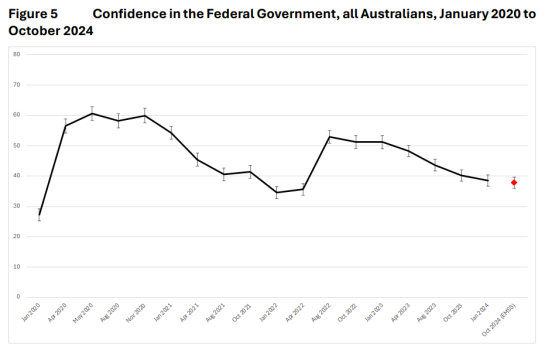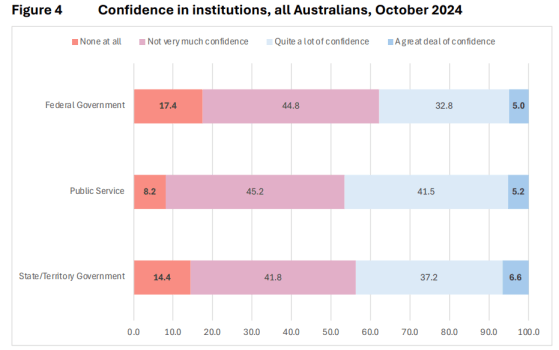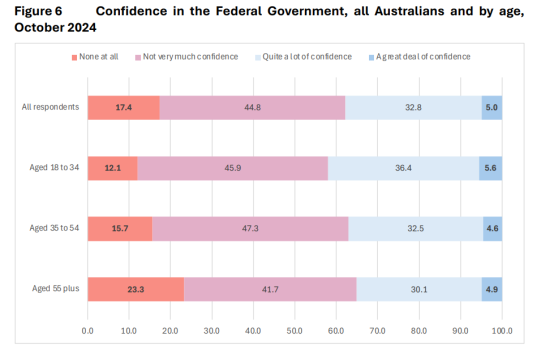Trust and confidence in the federal government is in decline, according to a recent study.
Conducted by the Australian National University in October, a survey of more than 3,500 Australians found that almost half of respondents (48.1%) have little-to-no trust in the Australian government – up from 42.1% in 2023 and 40.4% in 2022.

As study lead author Professor Nicholas Biddle explained, trust varies significantly by education, with higher trust levels among those with a university degree.
“Those with relatively low levels of education are also far more disengaged with politics. Only 39% of those that haven’t completed Year 12 say they are quite interested or very interested in politics,” Biddle said. “This is compared to 49.5% of those that have completed Year 12 and don’t have a degree, and 58.5% of those who have a degree.”
Respondents’ confidence in the federal government rated even lower, with 62.2% recording little-to-no confidence – lower than the pandemic peak in April-November 2020.

While there is no single explanation for the relatively low level of trust and confidence in the federal government, Biddle told Government News: “The data suggests that those who are experiencing financial stress have lower levels of trust and confidence than those that aren’t, so it is likely that the relatively poor performance of the Australian economy is a factor.”
And in what could be a worrying sign for the Albanese government ahead of next year’s federal election, Biddle said it is quite difficult to restore confidence after a long inflationary period.
“Even though inflation rates have come down – that is, the change in prices – people still see that prices are much higher than they were two-to-three years ago. Household income per capita has also declined, so people understandably feel worse off.”
However, Biddle added: “Leaving aside some external factors, confidence will be restored if the government is able to show that they are focused on the issues that are of particular importance for the average voter, that they have a credible plan for the next three-to-five years, and that people’s lives will be better under Labor than the alternative.”
When asked whether the ANU statistics reflect a global trend, Biddle told GN: “Incumbent governments across the high income democracies have experienced a decline in support, trust, and confidence. In many ways though, the Australian government is doing relatively well, especially seeing as the Australian economy has not outperformed many of the countries that we have outperformed over recent years.”

The ANU study also found more than half of respondents (56.6%) said they had little-to-no confidence in state and territory governments. The public sector did little better, with 53.4% of respondents ticking the little or no confidence box.
As well, nearly half of respondents (48.8%) agree or strongly agree that politicians are corrupt.

In better news, despite the challenges faced by Gen Z – most notably renting and housing affordability – the study found almost half of respondents aged 18 to 34 years (47%) have quite a lot or a great deal of confidence in the Australian government. This falls to 42.5% for those aged 35 to 54.
The reasons behind the higher confidence levels among the young need a lot more digging into, said Biddle. “Partly, it reflects the fact that younger voters tend to support parties of the centre-left, and therefore relative affinity for the Labor party compared to the Coalition is translating into a more stable level of confidence.”
He told GN: “It may also reflect that for some of the issues that younger Australians are most focused on – housing, the environment, education, social justice issues – the Labor party is still seen as having a more attractive and credible policy position.”





Leave a Reply